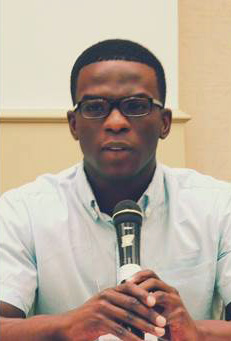Marcos Barbery sat across from the teenager in a visitor’s booth at Orleans Parish Prison. The boy’s face was swollen like a balloon. His nose was disfigured and his bottom lip had been ripped open and sewn back together — injuries from a jail fight that lasted for 10 minutes before a guard noticed.
The boy started to cry. Barbery shifted his gaze. “It’s a lot easier to look away,” he said at a New Orleans City Council committee meeting in April.
Barbery, who works for Orleans Public Defenders, was one of about a dozen juvenile advocates who spoke about a local campaign to keep criminal suspects as young as 14 out of one of the most dangerous jails in the country.
Until a few years ago, Louisiana law required youth to be jailed as adults if they were awaiting trial in adult court. Now it’s up to judges to decide, usually based on defense attorneys’ requests. But until recently, most New Orleans judges had continued to send them to Orleans Parish Prison.
Some members of a working group convened by Mayor Mitch Landrieu want to ensure young defendants are sent someplace safer — a place designed for them, not adults.
“These are young people. … If every single one of these had been interviewed, I bet you’d find they’d been victimized in prison either through a fight, beating or otherwise.”—Orleans Criminal District Judge Laurie White
Since December, these public officials have been trying to figure out whether all juveniles charged with serious crimes can be moved from Orleans Parish Prison and how much it would cost.
“These are young people. And so when they’re standing in front of a judge in criminal court, I’m concerned about their welfare, in prison,” Orleans Criminal District Judge Laurie White recently told the city council.
“If every single one of these had been interviewed,” she said, “I bet you’d find they’d been victimized in prison either through a fight, beating or otherwise.”
As of late April, said Glenn Holt, director of the Youth Study Center, a dozen boys 15 to 17 were awaiting trial in Orleans Parish Prison, the local jail that is undergoing court-ordered reforms.
The complex is notorious for inmate violence, sexual assault, escapes, inadequate health care and even inmate deaths. Despite reforms being implemented under the oversight of a federal judge, there is usually only one guard on duty for every dozen juveniles, said New Orleans City Councilwoman Susan Guidry.
As a result, these teenagers are confined to cells for up to 23 hours a day, said Theodore Shaw, a youth advocate for the Southern Poverty Law Center who has interviewed teens about the conditions at Orleans Parish Prison. They’re often beaten by fellow inmates and are sometimes even raped.
New Orleans is not alone in placing juveniles in adult jails as they await trial for serious crimes. Two-thirds of juveniles who are not freed on bail before trial in adult court are held in jails, according to the Campaign for Youth Justice, which is dedicated to getting youth out of adult criminal justice systems.
Yet according to the group’s research, as many as half of these youth end up being sent back to juvenile court or are not convicted.
In New Orleans, 38 percent of transferred youth are found not guilty, have their charges dismissed or get probation, according to a 2014 report by the Louisiana Center for Children’s Rights.

Shaw knows what it’s like to be inside. At 17, he became known as one of the “Jena 6” when he and five others were charged with attempted murder in connection with the 2006 beating of a high school student.
He spent nearly eight months in an adult jail, on lockdown 24 hours a day. Once he was tear-gassed so badly that he had to be rushed to a hospital.
“Disturbingly, my experience is far from an aberration,” Shaw said.
In the end, Shaw pleaded no contest to a charge of simple battery and was sentenced to seven days of probation.
In New Orleans, youth are no longer automatically sent to jail as they await trial in adult court for crimes such as armed robbery.
Instead, the working group — which includes city council and school board members, judges and other government officials — has worked to send some of them to the Youth Study Center, New Orleans’ juvenile lockup.
The newly erected facility is better staffed and safer, advocates say. It has youth-focused programming, new recreational facilities and more educational opportunities.
Those facilities are less detrimental than adult jails, youth advocates say, especially in light of research that shows that the human brain doesn’t fully develop until age 25.
Juveniles held in adult jails are more likely to be arrested again, according to the federal Centers for Disease Control, and a local study found that children housed in Orleans Parish Prison are 36 times more likely to commit suicide than those held in a juvenile facility.
“It’s important to recognize that they are coming back to our communities, and to use what we know about adolescent brains and emotions to make sure that they are ready to be successful and productive when they come home,” said Meredith Angelson, an attorney at the Southern Poverty Law Center in New Orleans.
In Louisiana, criminal suspects 17 and older are prosecuted in adult court. Juveniles as young as 14 can be tried as adults for the most violent crimes, such as rape and murder; those as young as 15 can be tried as adults for other serious offenses such as armed robbery.
Depending on the age of the defendant, it is up to the district attorney or a judge to decide whether to prosecute in juvenile or adult court, which in New Orleans is called Criminal District Court.
Until 2012, Louisiana law required juveniles charged with serious crimes to await trial in an adult jail if they couldn’t make bond. That changed with the passage of a law that said judges could decide whether to send defendants to adult jail as they awaited trial in Criminal District Court.
12Beds would be set aside at Youth Study Center for defendants in adult court28Beds would be available there for defendants in juvenile court
Last month, Guidry, who heads the council’s criminal justice committee, drafted an ordinance that would mandate that the Youth Study Center be “the appropriate adult facility for the pre-detention of all children.” The ordinance could effectively take the decision out of judges’ hands.
The ordinance would set aside 12 beds at the juvenile center for youth whose cases have been transferred to Criminal District Court, except those charged with murder, aggravated rape or aggravated kidnapping. The rest of the facility’s 40 beds would remain available for youths awaiting trial in Juvenile Court.

It’s a temporary solution, however, and it isn’t comprehensive. Teenagers facing the most serious charges, including murder and rape, would continue to await trial in Orleans Parish Prison.
“That’s part of why this ordinance is a compromise,” Angelson said. “It’s a compromise based on having to deal with the numbers of kids at hand and a limited number of safe beds.”
Asked about the effort to move juveniles out of the jail, Christopher Bowman, a spokesman for Orleans Parish District Attorney Leon Cannizzaro, said the district attorney doesn’t decide where to house “those youthful offenders who have been deemed by the court to be too dangerous to release on a low bond.”
In March, Cannizzaro expressed concern that some youth pose a risk to Youth Study Center staff and occupants.
Cannizzaro told The New Orleans Advocate that he recognizes the benefits of the social programs at the Youth Study Center, but he’ll continue to petition to move defendants to Orleans Parish Prison when they “assault the personnel and disrupt the social programming it provides.”
Advocates say several kinks need to be worked out before the city council passes Guidry’s ordinance.
It’s not yet clear, for example, what will happen if there are more than 12 juveniles awaiting trial in Criminal District Court — a particular concern given how the district attorney has handled serious charges involving juveniles.
In the past few years, Cannizzaro has dramatically increased the number of cases he transfers to adult court. It went up to 75 percent of eligible cases in 2014, according to The New Orleans Advocate. That has increased the number of inmates in the juvenile section of Orleans Parish Prison.
The Youth Study Center has also seen a spike in defendants awaiting trial in juvenile court, Holt said at the city council committee meeting in April.
Because of those rising figures, some youth advocates worry that the facility will run out of room for youth awaiting trial in adult court, forcing some of them back to Orleans Parish Prison.
“We can’t predict juvenile crime with any certainty, so you have to have some availability,” Holt said. “We make sure we have enough beds … if the trends change.”
19 daysAverage detention for defendants awaiting trial in Juvenile Court200 daysAverage detention for defendants in Criminal District Court
He also said he would need more staff because youth awaiting trial in Criminal District Court are held an average of 200 days compared to 19 days for those in juvenile detention. That means a bigger workload for his staff.
One solution, lawmakers said, would be to build an additional Youth Study Center facility.
Not everyone thinks that’s a good idea. Rachel Gassert, policy director for the Louisiana Center for Children’s Rights, said she doesn’t believe the number of juveniles committing minor offenses will continue to rise.
A new facility may hinder efforts to reduce the number of young people in jail. The saying in the juvenile justice community, Gassert said, is, “If you build it, they will come.”
While overcrowding generally leads to dangerous situations, she believes “a little bit of population pressure at facilities is not a bad thing. It makes sure we’re only detaining kids who present significant risk for public safety.”
Advocates say they will keep working to get all youth held at Orleans Parish Prison into youth-appropriate facilities — including those charged with murder and rape.
“The youth are constantly being surrounded by adults when they’re transferred [to Orleans Parish Prison], and that shouldn’t be happening,” Barbery said. “City leaders have to put politics aside and act in the best interest of all children.”
Guidry predicted that the city council will vote on her ordinance within the month and that a dozen beds at the Youth Study Center will be set aside by midsummer.
“That work continues,” Guidry said about efforts to get all children out of Orleans Parish Prison. “This is merely the first step.”
This story was done in collaboration with the Juvenile Justice Information Exchange, a project for the Center for Sustainable Journalism at Kennesaw State University near Atlanta, Georgia.


